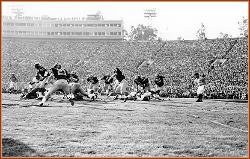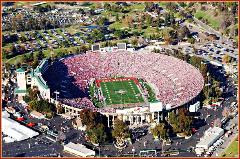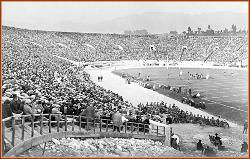Rutgers Stadium
The current Rutgers Stadium provided seating for 41,500 spectators, featuring a
5,000-seat upper deck on each side of the field; light stanchions that allow for network
television broadcasts of night games; a two-level press box on the west mezzanine; and
eight 1,000 square foot (93 m²) concession stands. Until 2004, the field maintained a
grass surface, but has since been replaced with Field Turf.
Following the success of the Football team in the 2005 and 2006 seasons where the team
reached consecutive bowl games for the 1st time in its history, speculation has arisen
regarding the possibility of increasing the stadium's capacity beyond 41,500 seats.
Rutgers Football Coach Greg Schiano hopes to get the school to increase the stadium's
capacity to 80,000, or roughly double current capacity. In the short term it is believed that
10,000-15,000 seats could be added in less than 1 year.
History
Overlooking the Raritan River in Piscataway, New Jersey (USA), the stadium is on the site of the first "Rutgers Stadium", which opened October
22, 1938, with a 32-0 victory over Hampden-Sydney College. The original stadium was built by the Works Project Administration during the later
years of the Great Depression. The first Rutgers Stadium served the university's football program until 1992, hosting 225 football games over
which Rutgers had a record of 168 wins, 53 losses, and four ties.
During this time, Rutgers Stadium hosted the NCAA Division I Men's Lacrosse Championship on five occasions.
For several years previous to this first "Rutgers Stadium," the Rutgers football program played at Neilson Field on the College Avenue Campus in
New Brunswick, New Jersey. The first intercollegiate football game, in which Rutgers beat Princeton with a score 6 to 4 on 6 November 1869, was
held on a field that is now occupied by the College Avenue Gymnasium.
During the construction of the second and current Rutgers Stadium, the Rutgers Scarlet Knights played the 1993 season at Giants Stadium in
East Rutherford, New Jersey, a facility operated by the New Jersey Sports and Exposition Authority which financed the new Rutgers Stadium
through a bond issue.
The Scarlet Knights had previously played several games at Giants Stadium, including the first football game hosted at that site: a 1976 victory
over Boston College, due to an NCAA rule that mandated that a team play at least half of its home games at a stadium with a seating capacity of
at least 30,000 to qualify as a Division I-A school.
Rutgers Stadium has also hosted NCAA tournament soccer and lacrosse games, including the NCAA Division I Men's Lacrosse Championship
games in 1998, 2001, and 2002. It has also hosted the North-South All-Star Game between teams organized by exceptional New Jersey senior
football players from North and South Jersey, and the Governor's Bowl, between New Jersey and New York State players, in alternating years.
Michie Stadium in West Point, New York hosts the latter game in the other seasons.
On 25 September 2005, Rutgers Stadium was the site of a lecture delivered by the Dalai Lama.
Heralded by many newspapers, sports writers, and Rutgers fans as the "most important game in Rutgers history", on 9 November 2006, a record
crowd of 44,111 attended a football game between Rutgers' Scarlet Knights (then ranked fifteenth on most college football polls) and the
Louisville Cardinals (then ranked third). The usual official capacity was exceeded due to additional student seating with temporary bleachers
located at the southern end of the stadium, as well as by moving the marching band from their usual spot in the stands to temporary bleachers in
the corner of the north end zone. At the next home game, against the Syracuse Orange on 25 November 2006, Rutgers Stadium posted its
second largest crowd with 43,791 in attendance. This game posted the 2nd largest viewing audience ever for an ESPN Thursday night college
football game. The largest audience happened one week earlier when an undefeated Louisville defeated an undefeated West Virginia.





